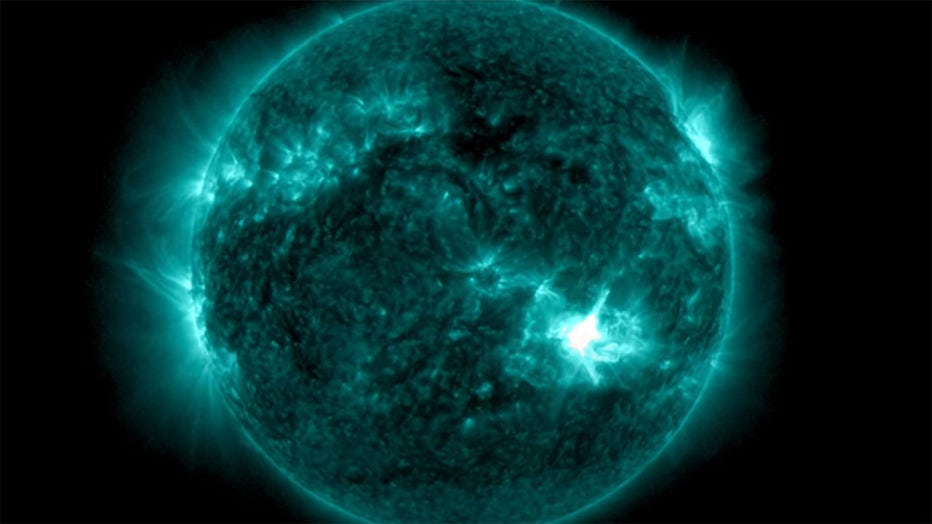Northern lights visible across North Texas due to 'extreme' solar storm
2024 has been the year of the celestial phenomena in North Texas. We've already seen a total solar eclipse, Now, we're seeing the aurora borealis!
A severe G5 geomagnetic storm began impacting Earth Friday, the first of its magnitude in more than 20 years.
PHOTOS: Northern lights around the world
Thanks to that storm, viewers across North Texas have begun seeing the celestial phenomenon.
The Northern Lights became visible to North Texans Friday after sunset and could last into the early hours of Saturday morning. Rural areas have been getting the best views.
NOAA upgraded a geomagnetic solar storm watch from a level 3 ("moderate") to a level 4 ("severe") and then level 5 ("extreme") on Thursday as several solar flares hurtle toward Earth and are expected to combine. That could grace the northern tier skies with brilliant auroras but also trigger GPS problems, hamper satellite communication, and cause blackouts of high-frequency radio.

Northern Lights visible in North Texas
2024 has been the year of the celestial phenomena in North Texas. We've already seen a total solar eclipse, Now, we're seeing the aurora borealis!
"Watches at this level are very rare," NOAA stated in the watch. "This is an unusual event."
Trey Cade is the director of Baylor's space weather research laboratory. He'll be one of many craning their heads to the skies this weekend.
"Just how we categorize hurricanes, and we have category one through five hurricanes, we have category one through five magnetic storms," Cade explained.
This is the first "extreme" Geomagnetic Storm Watch issued since October 2003.
Conditions dropped back to "severe" by Saturday morning.
Where in Texas can you view the northern lights?

Northern lights forecast for Texas
The northern lights could be visible in Texas from Friday night into Saturday morning due to a severe solar storm. FOX 4's Dylan Federico explains the phenomenon.
Despite low chances of visibility, people all over the metroplex have been able to see the lights.
People away from the city lights are getting the best views.
Going into the overnight, clouds could be an issue.
"If the storm kind of stays around the magnitude that it is or if it gets a little stronger, I would say it's worth taking a look," Dr. Cade said.
Featured
Solar flare could disrupt communications, produce northern lights
Northern lights could be visible in much of the U.S. this weekend, but the strong solar storm headed toward Earth could also potentially disrupt communications.
Additional solar eruptions could cause geomagnetic storm conditions to persist through the weekend.
What is a geomagnetic storm?

NOAA’s GOES-16 satellite captured the eruption from the sun that occurred around 2 p.m. EDT on May 9, 2024. Credit: NOAA
For most people, a Geomagnetic Storm Watch is not something to be concerned about. The watches help government agencies, power providers, telecommunication companies and satellite operators prepare to protect systems impacted by space weather.
Geomagnetic storms can produce stronger aurora borealis lights or Northern Lights, which normally occur at the poles, but space weather can cause the lights to expand into the northern edge of the U.S.
Geomagnetic storms could become more frequent over the next year as the sun begins to move into the solar maximum phase of its 11-year cycle.
A solar cycle is a sequence the sun’s magnetic field goes through every 11 years, where the field flips.
The source of this geomagnetic storm is a large, complex sunspot cluster that is 16 times the diameter of the Earth.
Featured
Dallas weather: Rain chances for Saturday, Mother's Day
Sorry moms, it's another weekend with rain in the forecast for North Texas.
An extreme geomagnetic storm in 2003 took out power in Sweden and damaged power transformers in South Africa.
The most intense solar storm in recorded history, in 1859, prompted auroras in central America and possibly even Hawaii.
NOAA forecasts the current 11-year solar cycle to peak sometime in 2024 or early 2025, and solar activity is likely to remain active for the next several months or even a few years.
Will the geomagnetic storm affect the power grid?
ERCOT, the operator of the Texas power grid, says they do not expect any grid reliability concerns during the storm. ERCOT says it will continue to monitor the conditions and, if needed, make updates to keep the public informed.
FOX Weather, FOX 13 Seattle and the Associated Press contributed to this report.




